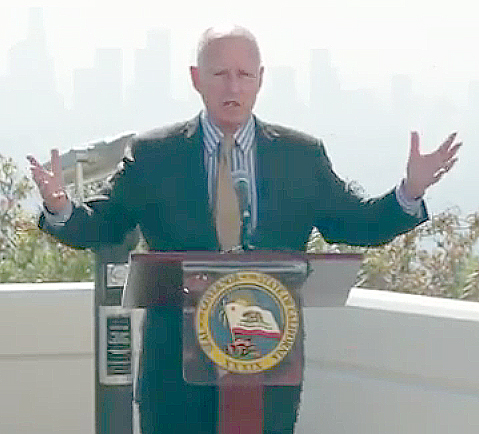With the slightly smoggy skyline of Los Angeles as backdrop, Governor Jerry Brown today signed S.B. 350, the bill that codifies many of the climate change goals he outlined last January.
The new state law, authored by Senators Kevin de Leon (D-Los Angeles) and Mark Leno (D-San Francisco), mandates two goals for the state: to increase renewable sources of electricity in the state to half of total sources by 2030, and to double statewide energy efficiency for electricity and natural gas. A third goal—to reduce petroleum use by half—was removed from the bill a few days before the deadline to pass it, when it became clear that a group of Assemblymembers who represent oil-producing areas of the state would not support it.
Nevertheless, the bill will still have far-reaching effects, and the petroleum reduction goal is incorporated into California Air Resources Board regulations even though it is not enshrined in law.
“This is a significant occasion,” said the governor. “In general, climate change is not news. It's happening too gradually, too diffusely.” Any opportunity to get people to focus on it, he said, is an opportunity mobilize the political will to take action. “It's a bad thing, happening rather slowly, and if we don't get it in time, it will be difficult to turn it back.”
The event celebrates a significant win for the legislative leaders present, as well as for the governor. S.B. 350 faced stiff resistance and a well-funded campaign by oil companies against its proposed gas reduction goals. When that part of the bill was removed, resistance disappeared, and the bill passed.
Although it no longer contains oil reduction goals, the other two goals could still have a profound impact on the way California uses and produces energy. For example, California's current Renewables Portfolio Standard has already helped reduce the cost of renewable energy, in some cases making it cost-competitive with fossil fuels. Because the bill also includes a focus on developing “widespread transportation electrification,” it could have a profound effect on how much gas is used for transportation in the state, even without specifically aiming to reduce petroleum use.
Senate President Pro Tem Kevin de Leon, the bill's co-author, pointed out at the signing ceremony that S.B. 350 “creates something that has been missing in our transportation market for nearly a century: legitimate competition for oil as the predominant source of fuel. This is a quiet revolution for consumers, public health, and the California economy.”
“This is not easy stuff,” said Governor Brown. “We are here because of oil: oil and gas—that's the source of [California's] prosperity; that's how we got here. But what's been the source of our prosperity now becomes the source of our downfall, if we don't get off it. And it's hard. That's why this is so significant.”
Brown gave a quick history lesson on California air quality policies, pointing out that much of the early work, including the creation of the Air Resources Board (ARB) and the Clean Air Act, happened under the Republican administrations of Reagan and Nixon. Referring to the hazy skyline behind him, he said, “I was in L.A. in the '40s and '50s, and it was a lot worse then.”
He also got in a dig at Assembly Democrats who wanted to weaken the regulatory power of the ARB in return for supporting the climate change agenda. “You do need a powerful ARB,” said Brown. “It's helpful. I love the legislature,” he joked, “but I don't want to trust you with too much power, at least not on a daily basis. You just set the big vision, and let the executive branch” work out the details. “I know this is controversial,” he added, laughing, as the state legislators in the audience, of which there were quite a few, laughed and shouted back at him.
De Leon said this bill, and others like it, “mainstreams” clean power and makes it accessible to everyone. California, he said, is “redefining the environmental movement. We are doing away with the tired stereotypes of environmentalism as a pastime of the wealthy, and of clean energy as a niche market. We are democratizing the benefits of our clean energy and climate change policies, making clean air a universal right, and increasing access to healthy, affordable renewable energy.
“Soon,” he said, “whether you live in Boyle Heights or Beverly Hills; Modesto or Marin; Sacramento or San Diego; you will have the same access to clean electricity and clean air.”
This bill is “for our health, and for our continued financial and political viability,” said Brown. “With great pleasure and excitement I sign this bill into law.”






